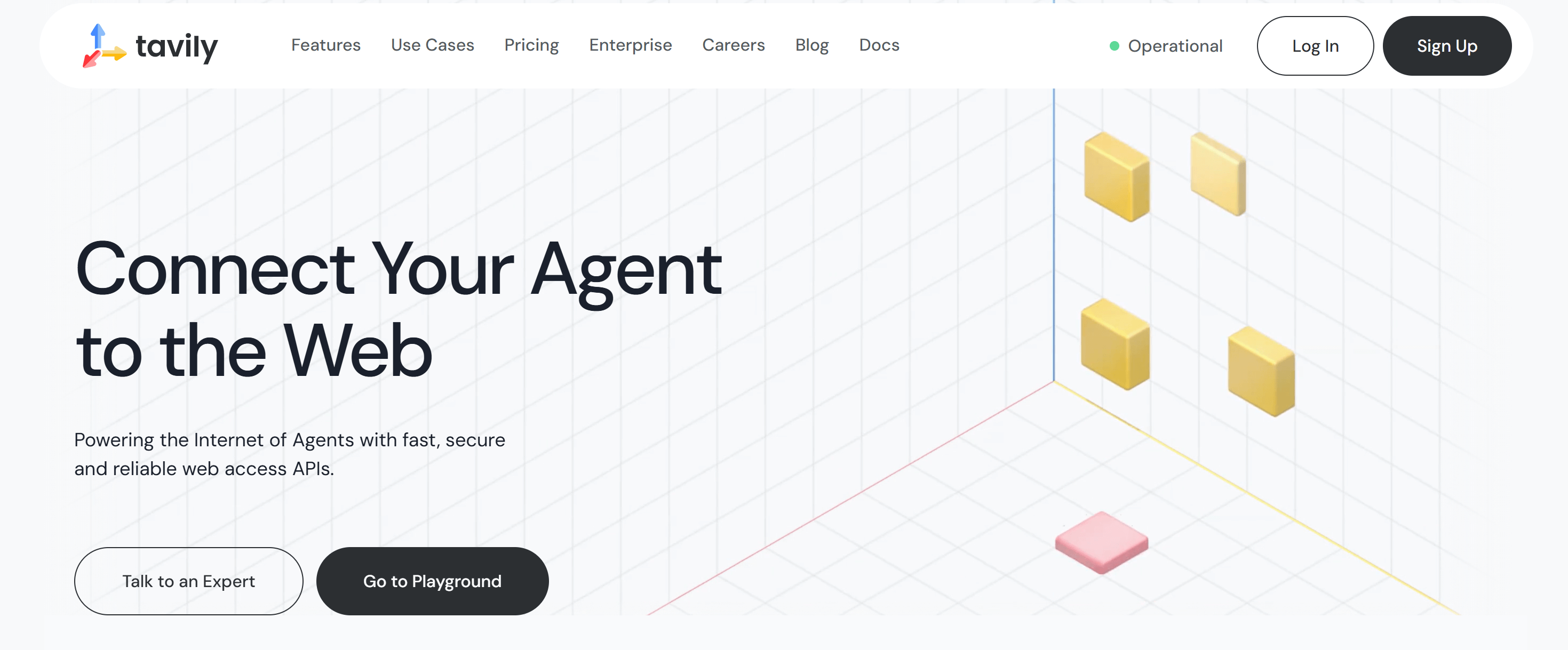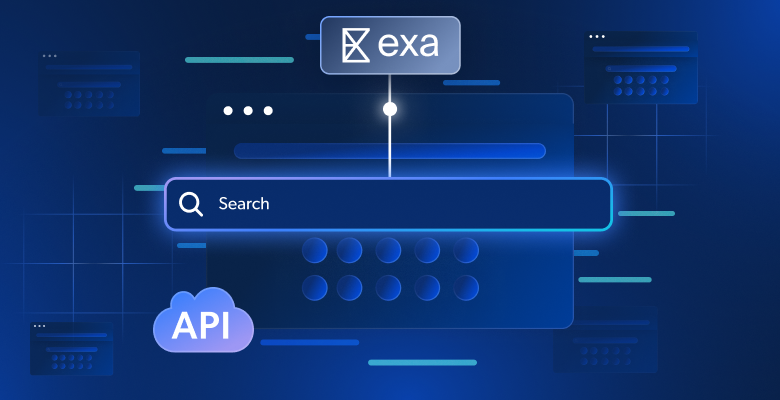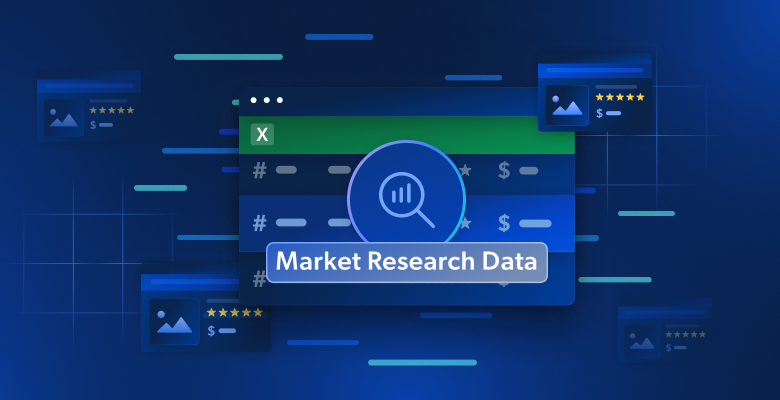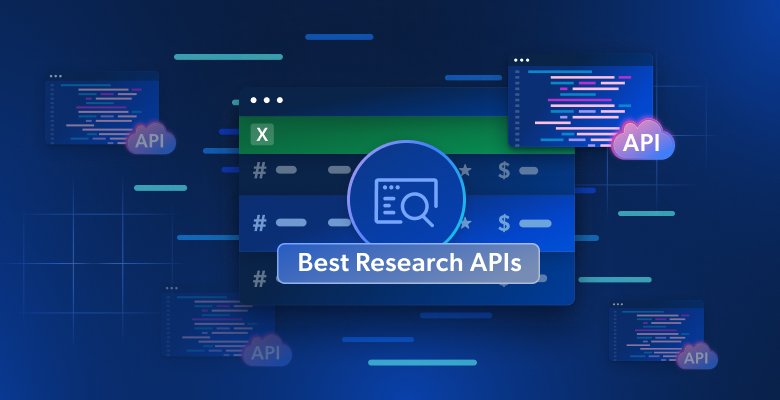In this blog post, you will see:
- What Exa is, the type of service it provides, the endpoints it offers, and its main features.
- Key aspects to focus on when evaluating Exa alternatives.
- The best alternatives to Exa on the market.
- A summary table comparing the Exa replacements presented here.
Let’s dive in!
TL;DR – Top Exa Alternatives
- Bright Data: Scalable AI web search, crawl, and enrichment APIs.
- Tavily: AI-focused search and crawl APIs for LLMs.
- Firecrawl: Open-source APIs for search, crawling, enrichment.
- Sonar: Perplexity AI’s real-time web-connected search APIs.
- Linkup: AI fact retrieval and company data enrichment API.
Exa: What It Is and Main Features

Exa, also known as Exa.ai, is an AI-powered search engine. It is designed specifically for AI applications, aiming to provide more accurate and relevant search results than traditional search engines.
More specifically, Exa operates as a real-time AI search platform. It exposes web crawling API, SERP API, and deep research tools, enabling you to search the Internet and extract structured content from websites.
The main API endpoints offered by Exa are:
- Web Search API: Fast, precise, and controllable web search powered by neural and keyword ranking.
- Crawling: Extract full page content for any URL, including subpages, formatted as summaries, snippets, or structured outputs.
- Websets: Discover people, companies, and more using a powerful sourcing tool. It can retrieve thousands of results and enrich them with additional data.
- Research: Agentic API endpoint for generating reports and structured outputs. This is ideal for data enrichment and advanced analysis.
- Answers: Fast, fully customizable, web-grounded LLM answers.
Features
Exa focuses on understanding the intent behind queries rather than relying solely on keyword matching. Plus, it equips you with advanced features for filtering and retrieving specific types of information.
Some of its core features and aspects include:
- Neural search: Understands the meaning of queries and retrieves results based on semantics, not just keywords.
- AI-focused: Buil to be integrated into AI applications, including LLMs and agentic AI workflows.
- API access: Exposes APIs for developers to integrate search functionalities into their applications.
- Advanced filtering: Refine searches using filters such as date ranges, domains, or specific phrases in content or URLs.
- Diverse result types: Returns various content types, including news, company data, scientific papers, blog posts, tweets, and movie reviews.
- Find similar: Identifies and retrieves similar pages based on a given URL.
- Large-scale searches: Performs searches that return a large number of results for comprehensive data collection.
- Contents retrieval: Instantly gathers full, cleaned, and parsed webpage content from search results.
- Highlights: Extracts relevant excerpts or highlights from retrieved content to quickly identify important information.
- Long Queries: Supports long query windows to match against semantically rich content, useful for detailed searches.
Main Factors to Consider When Evaluating Exa Alternatives
There are a few SERP and web search API services that can serve as alternatives to Exa.ai. To navigate this landscape, it is fundamental to analyze the available solutions on specific elements like:
- Features: The core capabilities and functionalities the service offers.
- Crawling capabilities: Whether the service can crawl websites, not just perform AI searches.
- Data enrichment capabilities: Whether the service can retrieve web data for industry-specific enrichment scenarios.
- Supported integrations: The AI agent building platforms, workflow-building tools, and frameworks supported natively by the solution.
- Supported search engines: The range of search engines the service can pull results from.
- Scalability: The volume of requests supported within a given time frame.
- Free option: Availability of a free plan or trial before committing to a paid subscription.
- Pricing: The provider’s pricing structure and cost-effectiveness.
Best 5 Alternatives to Exa.ai for AI Search, Data Enrichment, and Web Crawling
Explore the top Exa alternatives on the market, selected and ranked according to the criteria outlined earlier.
1. Bright Data

Bright Data is a leading web proxy and web scraping provider offering a broad set of tools for web data retrieval. All these tools integrate with AI systems, agents, and workflows.
When it comes to web search, Bright Data’s flagship solution is the SERP API. This endpoint enables scalable scraping of real-time results from major search engines, with dedicated scrapers like:
- Google Search API
- Bing Search API
- Yahoo Search API
- DuckDuckGo Search API
- Yandex Search API
- Naver Search API
- Baidu Search API
- And more…
The SERP API returns data in parsed JSON, raw HTML, or AI-ready Markdown formats. It supports multiple search types (maps, news, shopping, etc.), offers precise geo-targeting, handles high-volume traffic, and achieves average response times under one second.
What matters most is that SERP API can also function as an AI web search tool. Just like all other main Bright Data products, it is available via MCP server support and offers official integrations with LlamaIndex, LangChain, CrewAI, Agno, Dify, Zapier, and more than 70 other platforms.
When comparing Bright Data to Exa, some of its other relevant products include:
- Crawl API: Automates content extraction from any domain by mapping entire sites in one request.
- Enrichment datasets: Access enriched datasets from LinkedIn, CrunchBase, Owler, Indeed, and more for market intelligence and business insights.
- Deep Lookup: Deep Lookup is Bright Data’s most advanced Exa alternative for Websets. It uses AI to turn plain English queries into accurate, structured datasets. Find entities like companies, people, products, news, or properties by applying detailed filters and custom columns. It supports natural language prompts, structured lookups, and delivers transparent, auditable, exportable results for fast, reliable research and analysis.
These solutions enable AI apps to search and crawl the web. In the Bright Data AI infrastructure, you will find tools to extract data from and interact with the web at scale, with enterprise-grade performance, global coverage, and top-notch technical support.
Remember that the company operates on a pay-per-success model, offering both pay-as-you-go and fixed pricing plans.
This combination of breadth, performance, and AI-ready integrations makes Bright Data the best Exa alternative currently available.
Features:
- Precise searches down to the city level in 195 countries.
- Real-time search results.
- 99.9% network uptime.
- 99.9% success rate.
- Ability to map entire site structures in a single API request.
- Native IP rotation with built-in support for 150M+ proxy IPs in 195 countries.
- Automatic anti-bot bypass with integrated CAPTCHA-solving.
- Results in JSON, HTML, Markdown, NDJSON, or CSV via Webhook/API.
- Auto-retry on failed requests.
- Built-in data validation capabilities.
- Support for MCP integration.
- Support for synchronous and asynchronous requests.
- Only pay for successful requests.
- Code examples in cURL, Node.js, Python, PHP, and more.
- 24/7 global customer support.
- Enterprise-grade support with dedicated account manager and 99.9% SLA.
- GDPR, CCPA, SOC 2, SOC 3, and ISO 27701 compliant.
Crawling capabilities: Yes, via the dedicated Crawl API product.
Data enrichment capabilities: Yes, via dedicated data enrichment features.
Deep entity lookup and structured search: Yes, via Deep Lookup, which supports plain English queries, custom columns, advanced filtering, and auditable results for precise, insight-rich datasets.
Supported integrations: LangChain, LlamaIndex, Zapier, Agno, Dify, n8n, CrewAI, xpander.ai, Make, Pica, and 65+ more.
Supported search engines: Google, Yahoo, DuckDuckGo, Yandex, Baidu, Naver, and others.
Scalability: Unlimited.
Free option: Yes, via a free trial.
Pricing: Starting from $1.5/1,000 results.
2. Tavily

Tavily is a search engine that supports AI agents and LLMs by feeding them with up-to-date, trusted, and concise web-based information. Its API endpoints go beyond simple searches, covering data enrichment and crawling scenarios, making it a valid alternative to Exa.
Overall, Tavily simplifies the process of building knowledge bases for AI systems. It offers a generous free plan, and all features are accessible via MCP for smooth integration into AI agents.
Features:
- Search API optimized for LLMs to reduce hallucinations.
- Plug-and-play setup with instant API key integration.
- Provides Search, Extract, Map, and Crawl API endpoints.
- Enterprise-level security and privacy compliance.
- API Playground for testing queries before integration.
- Email support for regular users and dedicated Slack channels for enterprises.
Crawling capabilities: Yes, via the Crawl to RAG feature.
Data enrichment capabilities: Yes, via dedicated Data Enrichment functionality.
Supported integrations: LangChain, LlamaIndex, and others.
Supported search engines: Custom search algorithm.
Scalability: 100 requests per minute on development environments and 1,000 in production.
Free option: Yes, via a free plan with 1,000 credits/mo.
Pricing:
- Pay As You Go: $0.008/credit
- Project: $30/mo
- Enterprise: Custom
3. Firecrawl

Firecrawl is a web scraping and crawling API service with an open-source core. Its goal is to transform websites and online information into LLM-ready data. While originally built primarily for web scraping, the product has evolved.
Firecral APIs now support search and crawling capabilities via dedicated Search and Crawl endpoints. Considering all its features, this makes it more than just an Exa alternative. Explore the top Firecrawl alternatives.
It supports LLM frameworks such as LangChain, LlamaIndex, Crew.ai, Composio, PraisonAI, Superinterface, and Vectorize. For low-code frameworks, it integrates with Dify, Langflow, Flowise AI, Cargo, and Pipedream, and can also connect with automation tools like Zapier and Pabbly Connect. All in all, you can find Firecrawl as a built-in tool in most AI agent development systems.
Features:
- Outputs structured content in Markdown, HTML, links, or screenshots.
- Multiple dedicated data retrieval, web search, and crawling endpoints.
- Can process hundreds of URLs in seconds, thousands during crawls.
- SDKs for Python, Node.js, Go, and Rust available.
- Available both as a cloud service and a self-hosted open-source option.
- Customizable crawling depth, tag exclusion, and link filtering.
- Search parameters like location, time, etc.
Crawling capabilities: Yes, via the dedicated /crawl endpoint.
Data enrichment capabilities: Yes, via Fire Enrich, an open-source project developed by the same company behind Firecrawl.
Supported integrations: Langchain, LlamaIndex, Dify, Flowise, CrewA, Langflow, camelAI, SourceSync.ai, and others.
Supported search engines: Undisclosed, but it utilizes Serper behind the scenes.
Scalability: From 5 to 2,500 calls per minute (based on your plan).
Free option: Yes, via a free-forever plan with 500 credits.
Pricing:
- Hobby: $19/mo for 3,000 credits per month
- Standard: $99/mo for 500,000 credits per month
- Growth: $399/mo for 500,000 credits per month
4. Sonar

Sonar is a series of LLMs developed by Perplexity AI and available via API. This infrastructure serves as an Exa alternative, providing web-connected AI search capabilities. Those endpoints allow you to integrate Perplexity’s generative AI search into your applications and products.
Just like Perplexity, it emphasizes well-cited, factually accurate AI-generated answers through grounded search. At the time of writing, the available Sonar models are:
- Sonar: For lightweight, cost-effective search, quick facts, news, simple Q&A, high-volume use.
- Sonar Pro: For advanced search with deeper content understanding, complex queries, and research.
- Sonar Reasoning: For fast problem-solving using step-by-step logic and search, including puzzles and math.
- Sonar Reasoning Pro: For enhanced multi-step reasoning with web search, research, and strategic planning.
- Sonar Deep Research: For exhaustive research and detailed report generation with comprehensive search results.
See how to use the Perplexity APIs for web scraping.
Features:
- Provides real-time, web-wide research and Q&A functionality.
- Retains context for improved query follow-ups.
- Guarantees no training on customer data.
- Offers self-serve API access for instant setup.
- Includes both lightweight and full-performance model options.
- Backed by Perplexity’s AI technology.
- Possibility to search by date and location.
- SOC II and GDPR compliance.
Crawling capabilities: Yes, via the possibility to limit searches to specific domains.
Data enrichment capabilities: Not via specific built-in features.
Supported integrations: n8n and others.
Supported search engines: Custom Perplexity-based AI model for searching.
Scalability: Depends on your Tier. It goes from 5 to 6,000 requests per minute.
Free option: Yes, via a free version of the Sonar API, which comes with token limits.
Pricing:
- Sonar:
- Low: $5/1,000 requests
- Medium: $8/1,000 requests
- High: $12/1,000 requests
- Sonar Reasoning:
- Low: $5/1,000 requests
- Medium: $8/1,000 requests
- High: $12/1,000 requests
- Sonar Deep Research:
- Search Queries: $5/1,000 requests
- Reasoning Tokens: $3/1,000,000 tokens
5. Linkup

Linkup is an AI search engine optimized for LLMs and AI agents. Just like Exa, it provides dedicated endpoints that deliver reliable content from trusted sources. In detail, it supports both fast fact retrieval and slower, more thorough deep intelligence searches.
On top of that, Linkup can enrich company profiles with market and competitive intelligence. Plus, it natively works with many AI orchestration solutions such as CrewAI, LangChain, and LlamaIndex, as well as automation tools like Make, n8n, and Zapier.
On the downside, Linkup does not directly support web crawling scenarios.
Features:
- Supports both fast fact retrieval and deep intelligence searches.
- Can handle complex queries through chain-of-thought reasoning.
- Can enrich company profiles with market and competitive intelligence.
- Integrates with top AI orchestration platforms and Claude Desktop.
- 24/7 priority support.
- GDPR and CCPA compliant.
Crawling capabilities: No
Data enrichment capabilities: Yes, that is one of the main supported use cases.
Supported integrations: CrewAI, Langchain, Make, n8n, Zapier, and many others.
Supported search engines: Custom AI-powered search system.
Scalability: No more than 10 queries per second.
Free option: Yes, via a free plan with €5 (~$5.85) worth of queries, every month.
Pricing:
- Pay as you go:
- Standard search: €5 (~$5.85) /1,000 searches
- Deep search: €50 (~$58.50)/1,000 searches
- Custom: Custom pricing for enterprise-grade solutions
Top Exa Alternatives: Summary Table
Compare the top Exa.ai alternatives at a glance through the summary table below:
| Exa alternative | Features | Crawling capabilities | Data enrichment capabilities | Integrations | Search engines | Scalability | Free option | MCP support | Pay-as-you-go plan | Entry price |
|---|---|---|---|---|---|---|---|---|---|---|
| Bright Data | Tons | ✅ | ✅ | LangChain, LlamaIndex, Zapier, CrewAI, Dify, and 70+ others | Google, Yahoo, DuckDuckGo, Yandex, Baidu, Naver, others | Unlimited | ✅ | ✅ | ✅ | $1.5/1,000 results |
| Tavily | Some | ✅ | ✅ | LangChain, LlamaIndex, and others | Custom search algorithm | 100-1,000 requests/minute | ✅ | ✅ | ✅ | $0.008/credit |
| Firecrawl | Many | ✅ | ✅ | LangChain, LlamaIndex, Dify, and others | Serper-powered | 5–2,500 requests/minute | ✅ | ✅ | ❌ | $19/mo |
| Sonar | Some | ✅ | ❌ | n8n, and others | Perplexity AI | 5-6,000 requests/minute | ✅ | ✅ | ✅ | $5/1,000 requests |
| Linkup | Some | ❌ | ✅ | CrewAI, LangChain, Make, n8n, and others | Custom AI search | 10 queries/second | ✅ | ✅ | ✅ | €5 (~$5.85)/1,000 searches |
Applying the same criteria, this is what you would get for Exa:
| Service | Features | Crawling capabilities | Data enrichment capabilities | Integrations | Search engines | Scalability | Free option | MCP support | Pay-as-you-go plan | Entry price |
|---|---|---|---|---|---|---|---|---|---|---|
| Exa | Many | ✅ | ✅ | LangChain, LlamaIndex, Dify, CreWAI, and many others | Custom AI-based search approach | 5 requests/second | ✅ | ✅ | ✅ | Multiple pay-as-you-go options |
For a deeper dive and to analyze other similar services, take a look at these comparison articles as well:
Conclusion
In this article, you discovered the best alternatives to Exa for AI web search, data enrichment, and crawling scenarios. With so many options available, comparing and testing them all can be costly and time-consuming. That is why we tested the top replacements for you.
Bright Data emerged as the best Exa alternative, offering a large suite of AI tools for data retrieval, searching, crawling, scraping, and much more. Thanks to this infrastructure, you can let your AI search, crawl, and navigate the web freely and at scale, without limits.
In particular, Bright Data’s SERP API provides data from multiple search engines, from Google to Yandex. This service can be easily integrated via API, MCP, or directly into LLMs and a wide range of AI agent frameworks.
Create a Bright Data account for free today and start exploring our AI web data access solutions!





